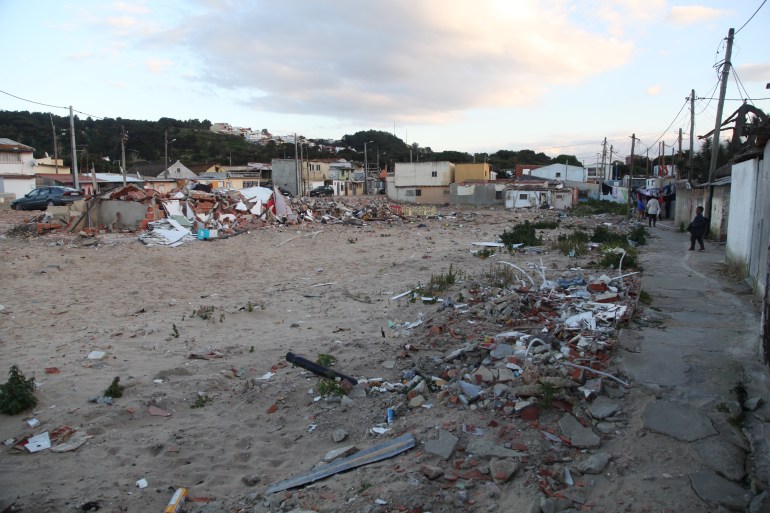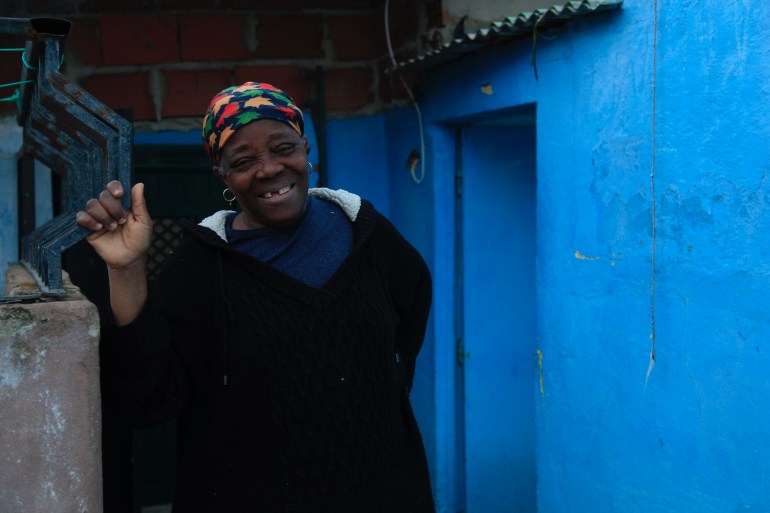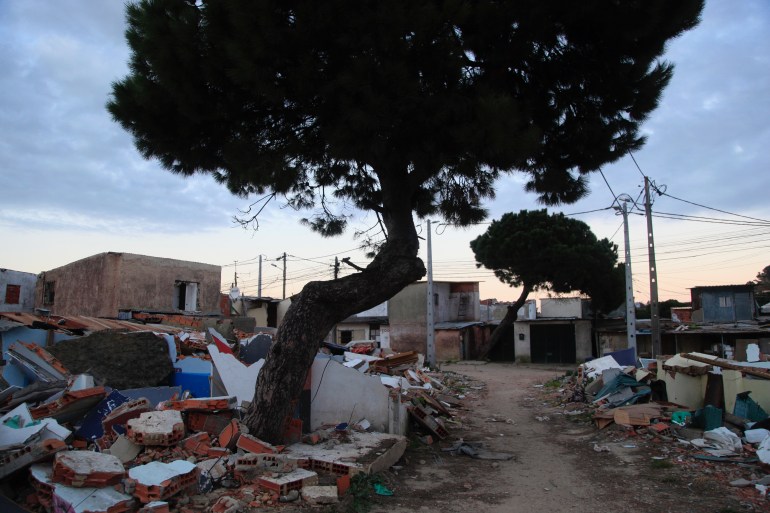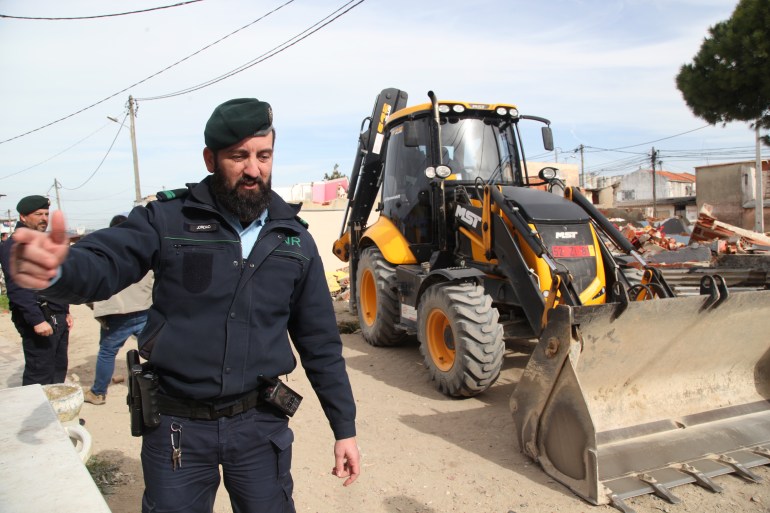Portugal’s worsening housing crisis hits a diverse neighbourhood
Vulnerable residents living near Lisbon appeal evictions allegedly ordered in an arbitrary manner.
![Adriano Kuzingami and his two children on the remains of their home, in Segundo Torrao [Ana Naomi de Sousa/Al Jazeera]](/wp-content/uploads/2023/03/Adriano_Kuzingami.jpeg?resize=770%2C513&quality=80)
Lisbon, Portugal – On the banks of the River Tagus, to the south of Lisbon, a wide clearing in the neighbourhood of Segundo Torrao is littered with piles of rubble.
Until six months ago, this empty plot was filled with houses and families.
Keep reading
list of 3 itemsPortugal’s Cristiano Ronaldo joins Saudi Arabia club Al Nassr
Roberto Martinez appointed new Portugal coach
Now, it is the backdrop of a struggle between the people who live here, and the local council trying to remove them and their houses.
More than 60 families from this self-built neighbourhood learned in June last year that their houses were earmarked for demolition by the Almada local council – which cited the risk of flooding posed by an underground water channel and the constructions on top of it.
Many have been hoping for a long time for better houses. But not everyone here has been offered permanent resettlement, leaving some in vulnerable situations and on the brink of homelessness.
The first houses were pulled down last October, but the demolitions have since been stalled by protests and legal challenges about the rights of residents to their homes.
“The way the council has proceeded has been unlawful on so many counts I don’t even know where to begin,” said Marina Caboclo, a lawyer representing seven of the families involved, and who launched a series of emergency injunctions against the council to stop demolitions in October.

Caboclo said residents were served demolition and eviction notices last June in a “chaotic and arbitrary” manner, with some told they had missed out on rehousing because they were not at home when the council knocked on their doors, or because they were not present at a consultation meeting, which she alleged is “completely illegal”.
“The council’s rehousing plan was based on a population survey of the neighbourhood from 2020,” said Caboclo, “which doesn’t account for changes since then like births, deaths, people moving.”
As a result, some have been allocated houses that are too small for their whole family, and others have not been offered an alternative home at all.
Eighteen families were excluded from the resettlement plan.
Renata Camargo is part of Canto do Curió, a cultural and social organisation working in the neighbourhood, and has been supporting some of the families threatened with eviction.
“We have no idea on what criteria the council is basing its decisions,” she said.
“The way it has treated the residents is inhumane. One pregnant woman was told that she couldn’t be given a bigger apartment ‘because the child might not even be born’.”
“It’s illegal under Portuguese law to evict families in vulnerable situations without first providing them with resettlement, yet clearly this has not been respected,” explained Caboclo, who also criticised the council for offering only temporary rehousing for families over the winter in a holiday park and a youth hostel on the other side of Greater Lisbon.
“It seems like the council treats these people like this because they live in a poor, self-built neighbourhood, and because many of them are immigrants,” she adds, “there is no respect for their rights and none at all for their dignity.”
Amnesty International says it is concerned by “the lack of empathy and constructive communication” from Almada council.
“One of these days I know they’re going to knock this house down – and I have nowhere else to go,” said Helena Sousa Carvalho, a 66-year-old woman who travelled from São Tomé and Principe three years ago with her daughter, who is receiving cancer treatment in Portugal.
Sousa Carvalho was refused a new home by the council and is still living in one of the remaining constructions that were prevented from being demolished in October.
She has not heard from the council since December, when she refused to leave the neighbourhood for temporary accommodation on the other side of Lisbon.

Like others who have remained in their houses while awaiting a response from the council to their appeals, Sousa Carvalho lives among the jagged construction debris and rubbish that was left behind by the excavators almost six months ago.
“The situation here is awful,” said Maria da Glória, who lives with her brother, sister and their children. “Now there are cockroaches, rats and infestations of flies like we’ve never had before.”
Maria’s family have appealed against the council’s decision not to resettle them – but like others in their situation, they have had no response at all for months. “We have no idea what’s going to happen to us,” she says, breaking into tears.
“My son was so traumatised by the demolitions in October that every time he hears a loud noise, he thinks the house is going to be demolished with him inside.”
‘Beginning of the end for Segundo Torrao’
Segundo Torrao’s origins lie in migration from Lisbon in the middle of the last century when people moved to the outskirts of the city and built their own homes from scratch.
Like dozens of self-built neighbourhoods, the construction of the houses evolved over time from shacks to bricks and mortar; they also frequently changed hands as people moved out and in.
About 2,500 people live there today, and much of the population are first or second-generation immigrants from the former Portuguese colonies of Cape Verde, Guinea Bissau, Angola and Mozambique, many living in precarious conditions.
Nonetheless, despite a nearby cement factory, the neighbourhood occupies an enviable location on the peaceful, sandy banks of the river, with views of Lisbon, and lying at walking distance to the affluent, beachside neighbourhood of Sao Joao da Caparica.
There are strong suspicions that the local council has other plans for the land, and that the eviction of the entire neighbourhood is on the cards.
Last October, Mayor Ines de Medeiros wrote in the local council’s magazine: “No matter how long it takes, this is the beginning of the end for Segundo Torrao.”
Huge swaths of the southern Tagus riverfront, once a dormitory for workers serving the city of Lisbon, have been earmarked for redevelopment amid Portugal’s tourism boom.
Segundo Torrao is minutes downriver from the Almada water city real estate megaproject, which projects “a mega urban zone” of more than 800,000 square metres (957,000 square yards) of tourism-based infrastructure.
Land and property prices in Portugal have soared over the last decade, fuelled by a tourism boom, foreign investment in real estate and a low housing stock.
Average house prices rose by more than 13 percent last year alone, with rents going up by almost 38 percent, meaning the average rent for a family-sized apartment in Lisbon’s city centre is now four times the minimum wage, at about 2,000 euros ($2,200) per month.
In February, Portugal announced plans to end the Golden Visa scheme that enables investors in property from non-EU countries to obtain Portuguese residency, one of several measures in a package proposed by the government to address the housing crisis.
The crisis has been exacerbated further by rising inflation and interest rates that are putting a strain on low- and middle-income households.
On Saturday, thousands protested in several cities, calling for affordable housing.

A recent study from the Portuguese consumer watchdog Deco Proteste reported that 66 percent of families in Portugal are facing financial difficulties and struggling to pay utility bills, food and fuel costs.
Meanwhile, social housing represents only 2 percent of Portugal’s housing stock, far less than the European average of 12 percent, leaving few safeguards for the most financially insecure.
More than 38,000 families in Portugal live in “undignified living conditions”, according to Amnesty International, which says that number has been increasing since 2018.
In a country report released recently, the rights group criticised “reports of forced evictions leaving people in worse housing situations – including, in some cases, homelessness – persisted, a situation which disproportionately affected people of Roma and African descent”.
Prime Minister Antonio Costa has repeatedly pledged to resolve “dignified housing for all families in Portugal” by April 2024, echoing slogans of the governments before him – but less than a year off, that seems impossible to achieve.
“In its housing policies, the government does not appear to be prioritising rehousing people who live in shacks or self-built neighbourhoods,” said Silvia Jorge, from the University of Lisbon’s Centre for Innovation in Territory, Urbanism and Architecture.
“From the lessons of the past, we know that slum rehousing projects are protracted and extremely complicated.”
2023 marks exactly 30 years since Portugal launched the “PER” (Programa Especial de Realojamento) rehousing programme, designed to demolish hundreds of self-built neighbourhoods and rehouse their communities in purpose-built housing estates, at a time when the country was aspiring to a more modern and European image.
But the PER, which is still ongoing, has had mixed results, and is criticised for having turned precarious communities into ghettos.

Like many who have been rehoused in the decades before him, Adriano Kunzingami says he would have stayed in Segundo Torrao, given the choice. His house was a stone’s throw from the water’s edge; now it lies in ruins.
His two children sit on the piles of rubble left behind him.
“We moved here a few months before my oldest son was born,” he said.
“We couldn’t afford to rent elsewhere, and this was a nice place for kids to grow up. Living here was part of getting my life back on track, finding work, raising a family.”
Their house is gone, but Kunzingami and his sons return frequently to the neighbourhood. His children still go to the local school, and their mother, with whom he shares custody, lives nearby.
Like many of the residents here, Kunzingami was hoping for the chance of a home with better conditions within the community he has been part of for more than 10 years.
Instead, he has been rehoused in a one-bedroom apartment more than 30km (19 miles) away.
“But,” he said, “Segundo Torrao will always be home to me.”
The Almada council, mayor’s office and the Ministry for Housing all declined to comment.